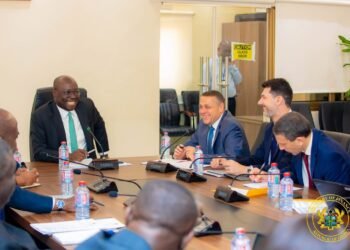The Vice president of Ghana, Dr. Mahamudu Bawumia has stated that the New Patriotic Party (NPP) is modernizing, digitizing, and formalizing the economy as part of its stabilization agenda.
The vice president made these remarks whilst speaking at the government’s Nation Building Updates on Thursday, November 26, 2020, at the Cedi conference hall, University of Ghana.
“…we are also modernizing, digitizing, and formalizing the economy. One of the biggest issues confronting our economy as with many other developing economies is its highly informal nature, along with the manual bureaucratic and cumbersome processes involved in the delivery of government services.
“Over 90% of Ghanaians had no unique identity. There was no working address system; over 70% of those eligible to have bank accounts have no bank accounts; most transactions are cash-based.
“Less than 10% of the population have Tax Identification Numbers (TIN) and clearing goods at the port, obtaining a driver’s license, passport, renewing your NHIS card, purchasing electricity unit for your meter, obtaining birth certificates, manual and cumbersome court processes and so on were not only inefficient and costly, they became breeding grounds for corruption as bribes were demanded to circumvent the cumbersome processes.
This situation, according to the Vice President, has resulted in difficulty in solving crimes, and in higher interest rates at the banks, delay in obtaining government services, lower government services, and so on.
He stated that this situation has long been recognized but no government has undertaken a systematic analysis and a concerted effort to address these problems.
“We just lived with the problem, rather than solve it”, he lamented.
“The government of Nana Addo Dankwa Akuffo-Addo made the strategic decision to address these chronic problems by digitizing the Ghanaian economy as well as the process of delivery of many government services”, Dr. Bawumia added.
Dr. Bawumia further clarified that the overarching objective of this digitization drive is to formalize the economy, increase government revenue, eliminate corruption, and ultimately provide public services to citizens more efficiently and conveniently.
“To do this, we needed to put several pillars in place. We needed to issue a national ID card for all Ghanaians and residents in Ghana, implement a functional address system for the whole of Ghana – village and towns, provide financial services for the unbanked, thus get financial inclusion”.
He stated that the economy will move away from a cash base towards a cash-lite economy by implementing advanced payment systems and digitizing the provision of government services to eliminate human intervention as much as possible. He cited the implementation of the mobile money interoperability as one major success story.
“I’m very happy to note that tremendous progress has been made on all these promises in Ghana. Just within the last four years, it is phenomenal what has happened and Ghana is clearly on its way to becoming one of the most digitized economies in Africa”.
“Specifically, we have registered and issued biometric national ID cards which the NDC government could not do in 8 years. So far, 15.5 million people have been enrolled and the process will be completed in the first half of 2021. This has provided Ghana with a database that will be the anchor for all transactions in the future, providing a unique identity to all individuals.
“We have also implemented a digital address system covering every square inch of land or water in Ghana. In the process, we have identified and provided a unique address for all properties in Ghana. About 7.5 million properties”.
Dr. Bawumia also stated that the Land Use and Special Planning Authority working with the Municipal and District Assembly Authorities has also completed the provision for street naming and house numbers for every un-named street in Ghana.
“This has taken a lot of work to do but it has been done and the government will affix the address plate for every property in Ghana in the next few months. And we expect the process to be completed by the middle of 2021”.





















